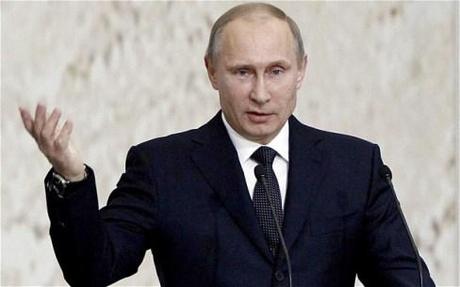
Image from telegraph.co.uk.
Despite stern warnings from President Obama, Russian President Vladimir Putin has activated large numbers of military personnel in the Crimean Peninsula of Ukraine.
Earlier this week, Russia’s Upper House of Parliament unanimously voted to authorize Putin to use military force in Ukraine. Russia’s actions came soon after Ukraine’s former President, Viktor Yanukovych, fled Ukraine following months of protests that turned into a full-scale civil uprising.
The United States as well as the rest of NATO and the European Union has officially supported Ukraine’s new government, led by acting president Olexandr Turchinov.
The rebellion in Ukraine originated in November when then President Yanukovych vetoed a bill, which would have made Ukraine a member of the European Union. By a large majority, the citizens of Ukraine strongly desired to join the EU as it would have served to further distance them from Russian influence.
On top of the vetoed bill, Ukrainian citizens rebelled against President Yanukovych due to the fact that human rights had gradually diminished throughout his time in office. Ukrainians saw their entrance into the EU as a chance to experience an augmentation of their freedom and civil rights.
The Crimean Peninsula is the southernmost region of Ukraine, surrounded by the Black Sea and more importantly, its eastern most border is extremely close to Russia. As a result, the majority of those living on the Peninsula are ethnic Russians.
Putin has thus far claimed that the Russian soldiers on the ground in Crimea, who have asserted their dominance over airports and government buildings, were already stationed in the region and therefore he has yet to deploy any military assets. Ultimately, this has served as Putin’s rationale in stating that this cannot be considered an invasion and is in line with international law.
Despite his assertions that this is not a military invasion, there are upwards of 6,000 Russian naval and airborne personnel operating in or around the Ukrainian Peninsula, according to an Obama administration official. The same official added that the Russian military personnel were “settling in” as an occupation force, as reported by the LA Times.
This past Saturday, Obama spoke on the phone with Putin for and hour and a half. During their conversation he urged Putin to put his troops on stand down in order to avoid a violent international confrontation.
Putin responded that Russian troops are only there to ensure the safety of Russian citizens living on the peninsula. Putin stated that he is concerned that they might be subject to persecution or even become victims of violence in light of the new leadership in Ukraine.
It is also important to note that the Russian government leases the Crimean port in Sevastopol in order to station a naval fleet with direct access to the Black Sea. In other words, the Crimean Peninsula is also a militarily strategic piece of real estate for Russia.
Putin has shown no signs of backing down in spite of the West’s requests for him to do so.
Currently, the Ukrainian military has not responded to the incursion of Russian forces and there have yet to be violent clashes between the two sovereign nations. Though a high-ranking Ukrainian officer has reported that the Russian military has given them an ultimatum to abandon their bases by 5 a.m. Sunday morning. At this point, they have made no effort to comply.
However, reports from the Crimean Peninsula describe continuous violence between Ukrainian citizens and ethnic Russians.
Prior to the presence of Russian troops, Obama had warned Russia that there would be “serious costs” if Putin ordered his military into the region. As of right now, high ranking officials of the Obama Administration have discussed the possibility of economic sanctions on Russia as well as ousting them from the G-8 Summit.
Secretary of State John Kerry will be making a trip to Ukraine on Tuesday in a show of support of the new Ukrainian government.
As of yet, the United States has yet to openly discuss any military action in the region. Though Secretary Kerry, in a recent statement, has said that all options are still on the table.

